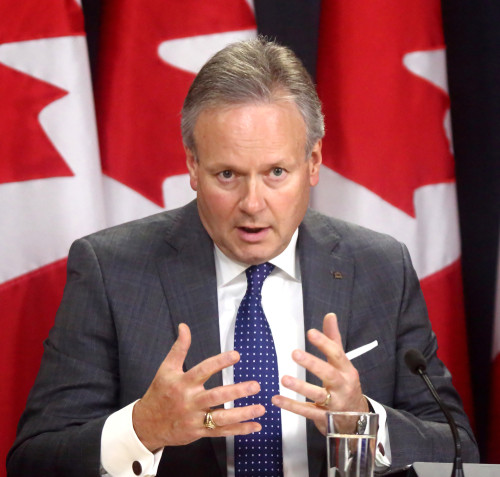“[Canada’s] policy rate will need to rise to neutral to achieve our inflation target.”

Stephen Poloz (Source: Shutterstock)
That was the headline-making quote yesterday from Bank of Canada boss Stephen Poloz.
Speaking in front of the parliamentary finance committee, he repeated what the BoC’s been saying for over a year: “Our estimate of neutral is in a range—currently 2 ½ to 3 ½ per cent. ”
“It shouldn’t be a hard thing for people to service their debt at those kinds of interest rates,” he ventured. “But if people have overextended themselves, given the low interest rates, then we’ve got a transition issue.”
With roughly 1 in 7 mortgagors being “highly leveraged” (our estimate based on BoC data), that “transition issue” could weigh on consumer spending, GDP and inflation. This, in turn, should somewhat limit how high rates can go.
The Cost to Borrowers
If you’ve got a mortgage, Poloz’s words mean this:
- If he’s right, rates will march at least 3/4 percentage point (75 bps) higher.
- Financial markets predict (based on forward rates) that we’ll hit Poloz’s minimum estimate of neutral by end of next year.
- With the average mortgage being roughly $250,000, three 1/4-point hikes would lift a typical adjustable rate mortgage payment by almost $100 a month.
- If the overnight rate hit the mid-point of Poloz’s neutral estimate (3.00%), you’d see interest rates near:
- 5.20% for prime rate
- 4.39% for the average 5-year fixed
- 4.35% for the average (new) variable-rate mortgage
- 6.24% for the minimum qualifying rate
- This is RateSpy’s estimate based on how much 5-year yields have risen relative to the overnight rate (in the modern era of monetary policy, post 1991)
One interesting aside: Ben Tal, probably Canada’s most quoted economist or close to it, told BNN that 3% is too high for “neutral.” Consumer credit is growing at the slowest pace in any non-recessionary period in the past 50 years, he said. “You don’t need to tell Canadians not to borrow. They are not borrowing.”
- Interest rate hikes will have the most effect where consumers “have the most debt,” said Poloz (i.e., Toronto and Vancouver).
Should this degree of rate tightening worry anyone? Yes, but only the most leveraged among us where every extra dollar of added interest burden is financed with either more debt or liquidation of assets.
Stress-Test Counterpoint
Speaking of leverage, Senator Pamela Wallin questioned the BoC’s assertion that B-20 is creating “better quality debt.” She noted that “the counter to that” is that borrowers shut out by government policy are “paying increased rates [elsewhere], which is not going to deal with their indebtedness.”
Carolyn Wilkins, Senior Deputy Governor at the BoC, sidestepped the comment about B-20 not resolving indebtedness (an important question that policymakers tend to dodge because there’s no easy answer). She replied by repeating that the share of borrowers who are highly indebted has dropped by roughly half (for insured mortgages at regulated lenders). Curiously, she claimed that private lending has “declined,” a claim contradicted by other data sources suggesting rapid growth in private lending.
She said that B-20’s limiting of refinance and home purchase options is “something to keep an eye on,” but it’s not a “major financial stability” issue.
It would have been enlightening to hear her view on whether the economic benefit of pushing more-indebted borrowers to non-federally regulated lenders offsets the economic risk those borrowers may soon pose. Somebody at the federal level should answer this question so people can be sure they didn’t overlook it.
Sidebar: One other notable from the BoC’s testimony yesterday:
- The bear market in Canadian oil (a.k.a., “WCS”), which is largely due to insufficient transportation capacity, is “a constraint on investment,” says the BoC Deputy Governor. It’s had little impact on mortgage rates so far, but this too could eventually restrain rate hikes. We wrote about it earlier in the month: Crashing Oil Could Affect Your Mortgage Rate.

 log in
log in
 Speaking of leverage, Senator Pamela Wallin questioned the BoC’s assertion that B-20 is creating “better quality debt.” She noted that “the counter to that” is that borrowers shut out by government policy are “paying increased rates [elsewhere], which is not going to deal with their indebtedness.”
Speaking of leverage, Senator Pamela Wallin questioned the BoC’s assertion that B-20 is creating “better quality debt.” She noted that “the counter to that” is that borrowers shut out by government policy are “paying increased rates [elsewhere], which is not going to deal with their indebtedness.”
1 Comment
Most people should be worried about a >6% qualifying rate due to the impact on housing prices. Even if you can afford higher payments on renewals, it will cut into disposable income and could push many mortgages underwater.